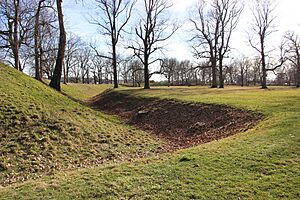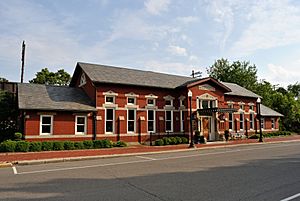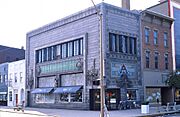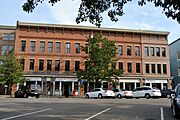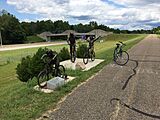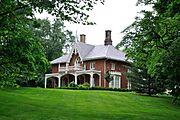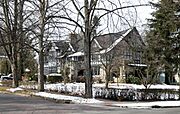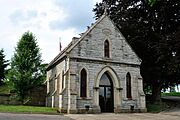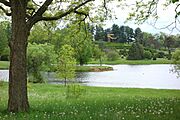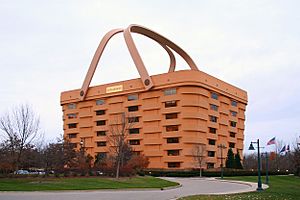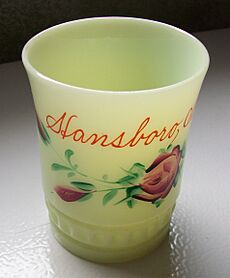Newark, Ohio facts for kids
Quick facts for kids
Newark, Ohio
|
|
|---|---|
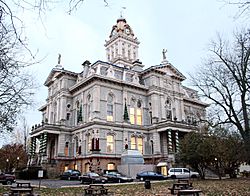
Licking County Courthouse
|
|
| Motto(s):
Land of Legend ⏤ Past and Future
|
|
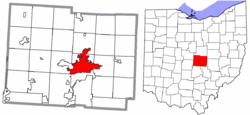
Location of Newark in Licking County and the state of Ohio
|
|
| Country | |
| State | |
| County | Licking |
| Settled | 1802 |
| Incorporated | 1813 |
| Area | |
| • Total | 21.37 sq mi (55.34 km2) |
| • Land | 20.89 sq mi (54.09 km2) |
| • Water | 0.48 sq mi (1.25 km2) |
| Elevation | 853 ft (260 m) |
| Population
(2020)
|
|
| • Total | 49,934 |
| • Density | 2,390.90/sq mi (923.12/km2) |
| Time zone | UTC−5 (Eastern (EST)) |
| • Summer (DST) | UTC−4 (EDT) |
| ZIP codes |
43055, 43056, 43058, 43093
|
| Area code(s) | 740, 220 |
| FIPS code | 39-54040 |
| GNIS feature ID | 1086473 |
| Website | http://www.newarkohio.gov/ |
Newark (pronounced NEW-erk) is a city in Ohio, United States. It is the main city of Licking County. Newark is about 40 miles (64 km) east of Columbus, where two parts of the Licking River meet.
In 2020, about 49,934 people lived in Newark. This makes it the 18th largest city in Ohio. Newark is famous for once being home to the world's largest basket, which was the headquarters of the Longaberger Company. The city is also part of the larger Columbus area.
Newark is also known for the Newark Earthworks. These are very old structures built by the Hopewell culture. The Great Circle and other mounds are in the nearby city of Heath, Ohio. These earthworks are a National Historic Landmark and are cared for by the Ohio History Connection.
Contents
History of Newark, Ohio
Long ago, indigenous peoples lived in the river valleys of this area for thousands of years. From about 100 AD to 500 AD, the Hopewell culture built many amazing earthen mounds and enclosures in Newark and Heath. These structures form the largest earthwork complex in the Ohio River Valley.
The Newark Earthworks cover several square miles, about 206 acres. They are a National Historic Landmark and are managed by the Ohio History Connection.
Ancient Earthworks: A Closer Look
The Observatory Mound, Observatory Circle, and the Octagon earthworks stretch for almost 3,000 feet (914 meters). The Octagon alone is big enough to hold four Roman Coliseums. The Great Pyramid of Giza in Egypt would fit perfectly inside Observatory Circle.
The Newark Great Circle, located in Heath, is even larger. It is 1,180 feet (360 meters) across and is the biggest circular earthwork in the Americas. Its walls are about 8 feet (2.4 meters) high, with a 5-foot (1.5 meters) deep moat around them.
Scientists who study ancient sites believe the Hopewell people had advanced knowledge of astronomical events. They used this knowledge to build these earthworks for observing stars and celebrating important dates. Today, the Ohio History Connection protects the Great Circle Earthworks in a public park called Mound Builders Park.
European-American Settlement in Newark
The first European-American settlers arrived in 1802. They were led by General William C. Schenck, who named the new village after his hometown of Newark, New Jersey.
In the 1800s, Newark grew because of new transportation links. In 1825, the Ohio and Erie Canal project began near Newark. This canal helped connect the city to major trade routes. Later, in the 1850s, railroads like the Pittsburgh, Cincinnati, Chicago and St. Louis Railroad and the Central Ohio Railroad also came through Newark.
The Heisey Glass Company started in Newark in 1895. It made beautiful glass for 62 years. Today, you can visit the National Heisey Glass Museum in Newark to see their work. In 1909, The Arcade opened in Newark. It was one of the city's first large indoor shopping areas, like an early version of a shopping mall.
Geography of Newark
Newark covers about 21.37 square miles (55.34 square kilometers). Most of this area is land, with a small part being water. The city is located at 40.063014 degrees North latitude and -82.416779 degrees West longitude.
Newark's Climate
| Climate data for Newark, Ohio (1991–2020 normals and extremes 1934–present) | |||||||||||||
|---|---|---|---|---|---|---|---|---|---|---|---|---|---|
| Month | Jan | Feb | Mar | Apr | May | Jun | Jul | Aug | Sep | Oct | Nov | Dec | Year |
| Record high °F (°C) | 76 (24) |
77 (25) |
85 (29) |
90 (32) |
95 (35) |
101 (38) |
106 (41) |
101 (38) |
103 (39) |
90 (32) |
81 (27) |
76 (24) |
106 (41) |
| Mean maximum °F (°C) | 60.4 (15.8) |
63.0 (17.2) |
72.1 (22.3) |
81.2 (27.3) |
86.7 (30.4) |
92.1 (33.4) |
92.5 (33.6) |
91.6 (33.1) |
88.6 (31.4) |
81.2 (27.3) |
70.4 (21.3) |
61.4 (16.3) |
93.7 (34.3) |
| Mean daily maximum °F (°C) | 36.4 (2.4) |
39.6 (4.2) |
49.7 (9.8) |
62.8 (17.1) |
72.7 (22.6) |
81.1 (27.3) |
84.3 (29.1) |
82.8 (28.2) |
76.3 (24.6) |
64.4 (18.0) |
51.7 (10.9) |
40.7 (4.8) |
61.9 (16.6) |
| Daily mean °F (°C) | 27.3 (−2.6) |
29.7 (−1.3) |
38.6 (3.7) |
49.9 (9.9) |
60.2 (15.7) |
69.1 (20.6) |
72.6 (22.6) |
71.0 (21.7) |
63.9 (17.7) |
52.2 (11.2) |
41.1 (5.1) |
32.2 (0.1) |
50.7 (10.4) |
| Mean daily minimum °F (°C) | 18.2 (−7.7) |
19.7 (−6.8) |
27.4 (−2.6) |
37.1 (2.8) |
47.7 (8.7) |
57.1 (13.9) |
60.9 (16.1) |
59.1 (15.1) |
51.5 (10.8) |
40.0 (4.4) |
30.5 (−0.8) |
23.7 (−4.6) |
39.4 (4.1) |
| Mean minimum °F (°C) | −2.1 (−18.9) |
2.8 (−16.2) |
12.0 (−11.1) |
24.3 (−4.3) |
34.8 (1.6) |
44.9 (7.2) |
51.5 (10.8) |
49.9 (9.9) |
39.3 (4.1) |
28.2 (−2.1) |
17.8 (−7.9) |
8.1 (−13.3) |
−4.7 (−20.4) |
| Record low °F (°C) | −24 (−31) |
−26 (−32) |
−7 (−22) |
12 (−11) |
23 (−5) |
32 (0) |
41 (5) |
38 (3) |
25 (−4) |
14 (−10) |
−4 (−20) |
−21 (−29) |
−26 (−32) |
| Average precipitation inches (mm) | 3.21 (82) |
2.56 (65) |
3.61 (92) |
4.01 (102) |
4.24 (108) |
4.69 (119) |
4.56 (116) |
3.89 (99) |
3.24 (82) |
3.11 (79) |
2.99 (76) |
3.29 (84) |
43.40 (1,102) |
| Average snowfall inches (cm) | 7.2 (18) |
3.9 (9.9) |
2.2 (5.6) |
0.1 (0.25) |
0.0 (0.0) |
0.0 (0.0) |
0.0 (0.0) |
0.0 (0.0) |
0.0 (0.0) |
0.0 (0.0) |
0.2 (0.51) |
1.6 (4.1) |
15.2 (39) |
| Average precipitation days (≥ 0.01 in) | 12.7 | 10.4 | 10.8 | 12.5 | 12.8 | 11.3 | 11.4 | 10.3 | 8.8 | 10.1 | 10.2 | 11.8 | 133.1 |
| Average snowy days (≥ 0.1 in) | 3.9 | 3.3 | 1.2 | 0.1 | 0.0 | 0.0 | 0.0 | 0.0 | 0.0 | 0.0 | 0.3 | 1.9 | 10.7 |
| Source: NOAA | |||||||||||||
People of Newark
| Historical population | |||
|---|---|---|---|
| Census | Pop. | %± | |
| 1810 | 232 | — | |
| 1820 | 410 | 76.7% | |
| 1830 | 999 | 143.7% | |
| 1840 | 2,705 | 170.8% | |
| 1850 | 3,654 | 35.1% | |
| 1860 | 4,675 | 27.9% | |
| 1870 | 6,698 | 43.3% | |
| 1880 | 9,600 | 43.3% | |
| 1890 | 14,270 | 48.6% | |
| 1900 | 18,157 | 27.2% | |
| 1910 | 25,404 | 39.9% | |
| 1920 | 26,718 | 5.2% | |
| 1930 | 30,596 | 14.5% | |
| 1940 | 31,487 | 2.9% | |
| 1950 | 34,275 | 8.9% | |
| 1960 | 41,790 | 21.9% | |
| 1970 | 41,836 | 0.1% | |
| 1980 | 41,162 | −1.6% | |
| 1990 | 44,389 | 7.8% | |
| 2000 | 46,279 | 4.3% | |
| 2010 | 47,573 | 2.8% | |
| 2020 | 49,934 | 5.0% | |
| Sources: | |||
Newark, Ohio, is the second-largest city named Newark in the United States. Only Newark, New Jersey has more people. Newark, Ohio, is part of the larger Columbus, Ohio metropolitan area. The average household income in the city was $52,570.
Newark's Population in 2010
In 2010, there were 47,573 people living in Newark. There were 19,840 households and 12,057 families. The city had about 2,278 people per square mile (879 per square kilometer).
Most people in Newark were White (92.8%). About 3.3% were African American, and 0.3% were Native American. About 1.2% of the population was Hispanic or Latino.
About 30.8% of households had children under 18. The average household had 2.35 people, and the average family had 2.94 people. The average age in the city was 37.3 years old. About 24% of residents were under 18.
-
Home Savings Association Bank, designed by Louis Sullivan
-
The nearby Dawes Arboretum south of Newark
Economy and Businesses in Newark
Newark is home to several big manufacturing companies. Holophane, started in 1898, is one of the oldest makers of lighting products in the world. Owens Corning Fiberglas also has a main factory here. State Farm Insurance has a regional office in Newark. The Park National Bank is also based in downtown Newark.
Several industrial parks in Newark host major companies. These include Kaiser Aluminum, Dow Chemical Company, General Electric, and Boeing. The Longaberger Company, famous for making baskets, had its headquarters in Newark. This building was designed to look like a giant "medium market basket."
The main shopping center nearby is the Indian Mound Mall. It is located in Heath. The mall is named after the ancient Newark Earthworks, which are less than a mile away.
Education in Newark
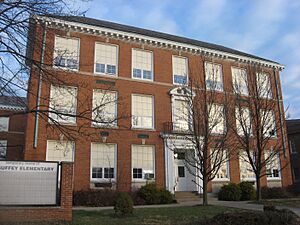
The Newark City School District serves the city. Newark High School has about 1,400 students. Its sports teams compete at a high level in Ohio. The school is also known for its strong academic and performing arts programs. The Newark High School Marching Band has gone to the state finals for 42 years in a row.
A branch of Ohio State University is also in Newark. The Ohio State University at Newark opened in 1957. It has over 2,800 students and is the most diverse campus in the Ohio State system. Students can earn Associate and Bachelor's degrees here. This campus shares its buildings with COTC (Central Ohio Technical College), a two-year college. COTC offers many certificate and associate degree programs to about 3,000 students.
Newark also has private religious schools, such as St. Francis de Sales School and Newark Catholic High School. C-TEC (Career and Technology Education Centers of Licking County) offers programs for high school students and adults. Newark also has a public library, which is part of the Licking County Library System.
Transportation in Newark
Licking County Transit provides bus services in the area. GoBus also has a route that connects Newark to other cities like Columbus and Wooster.
Notable People from Newark
Many interesting people have come from Newark, Ohio:
- Gary A. Braunbeck, a horror author
- John Clem, one of the youngest soldiers in the United States Army
- Woody English, a baseball player for the Chicago Cubs
- Jon Hendricks, a famous jazz singer
- Derek Holland, a professional baseball pitcher
- Jerrie Mock, the first woman to fly solo around the world
- Wayne Newton, a well-known singer and actor, grew up in Newark
- Fred Schaus, a Hall of Fame basketball coach
- Jim Tyrer, a professional football player
- Geoffrey C. Ward, a historian and writer
- William Burnham Woods, a Justice on the U.S. Supreme Court
See also
 In Spanish: Newark (Ohio) para niños
In Spanish: Newark (Ohio) para niños
 | Anna J. Cooper |
 | Mary McLeod Bethune |
 | Lillie Mae Bradford |




